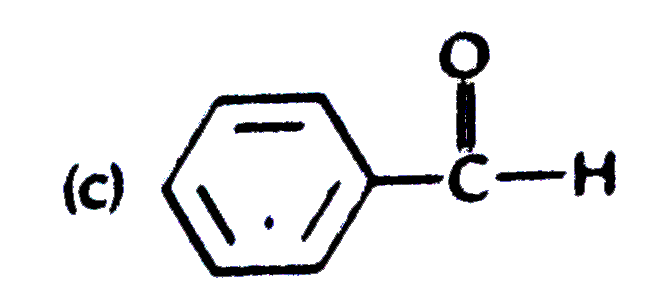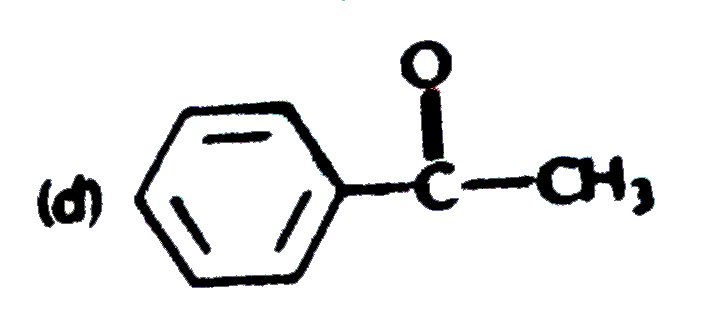Which of the following compounds is the most reactive towards nucleophilic addition reactions?
CH3−O∣∣C−H
CH3−O∣∣C−CH3


The correct Answer is:A
To determine which of the given compounds is the most reactive towards nucleophilic addition reactions, we need to analyze the reactivity of aldehydes and ketones based on two main factors: steric hindrance and electronic effects.
1. Identify the Compounds:
The compounds given in the question are:
- 1. Acetaldehyde (CH3CHO)
- 2. 2-Propanone (CH3COCH3)
- 3. Benzaldehyde (C6H5CHO)
- 4. Acetophenone (C6H5COCH3)
2. Classify the Compounds:
- Acetaldehyde and Benzaldehyde are aldehydes.
- 2-Propanone and Acetophenone are ketones.
3. Understand Reactivity:
Aldehydes are generally more reactive than ketones towards nucleophilic addition reactions. This is due to:
- Steric Hindrance: Ketones have two alkyl groups attached to the carbonyl carbon, which can create more steric hindrance compared to aldehydes that have only one alkyl group and one hydrogen atom.
- Electronic Effects: The presence of more electron-donating groups (like alkyl groups) in ketones decreases the positive character of the carbonyl carbon, making it less susceptible to nucleophilic attack.
4. Analyze Each Compound:
- Benzaldehyde: Has a large benzene ring, which contributes to steric hindrance, making it less reactive.
- Acetophenone: Also has a benzene ring and an additional methyl group, leading to increased steric hindrance and decreased reactivity.
- 2-Propanone: Has two methyl groups, which provide some steric hindrance and electron donation, reducing reactivity.
- Acetaldehyde: Has only one methyl group and one hydrogen, resulting in less steric hindrance and less electron donation compared to the ketones.
5. Conclusion:
Based on the analysis, acetaldehyde (CH3CHO) is the least hindered and has the least electron donation compared to the other compounds. Therefore, it is the most reactive towards nucleophilic addition reactions.
Final Answer:
The most reactive compound towards nucleophilic addition reactions is Acetaldehyde (CH3CHO).
The compounds given in the question are:
- 1. Acetaldehyde (CH3CHO)
- 2. 2-Propanone (CH3COCH3)
- 3. Benzaldehyde (C6H5CHO)
- 4. Acetophenone (C6H5COCH3)
- Acetaldehyde and Benzaldehyde are aldehydes.
- 2-Propanone and Acetophenone are ketones.
Aldehydes are generally more reactive than ketones towards nucleophilic addition reactions. This is due to:
- Steric Hindrance: Ketones have two alkyl groups attached to the carbonyl carbon, which can create more steric hindrance compared to aldehydes that have only one alkyl group and one hydrogen atom.
- Electronic Effects: The presence of more electron-donating groups (like alkyl groups) in ketones decreases the positive character of the carbonyl carbon, making it less susceptible to nucleophilic attack.
- Benzaldehyde: Has a large benzene ring, which contributes to steric hindrance, making it less reactive.
- Acetophenone: Also has a benzene ring and an additional methyl group, leading to increased steric hindrance and decreased reactivity.
- 2-Propanone: Has two methyl groups, which provide some steric hindrance and electron donation, reducing reactivity.
- Acetaldehyde: Has only one methyl group and one hydrogen, resulting in less steric hindrance and less electron donation compared to the ketones.
Based on the analysis, acetaldehyde (CH3CHO) is the least hindered and has the least electron donation compared to the other compounds. Therefore, it is the most reactive towards nucleophilic addition reactions.
The most reactive compound towards nucleophilic addition reactions is Acetaldehyde (CH3CHO).
Topper's Solved these Questions
- ALDEHYDE, KETONES AND CARBOXYLIC ACIDSBOOK - NCERT EXEMPLAR ENGLISHCHAPTER - ALDEHYDE, KETONES AND CARBOXYLIC ACIDSEXERCISE - Short Answer Type Questions
28 Videos
- ALDEHYDE, KETONES AND CARBOXYLIC ACIDSBOOK - NCERT EXEMPLAR ENGLISHCHAPTER - ALDEHYDE, KETONES AND CARBOXYLIC ACIDSEXERCISE - Long Answer Type Questions
4 Videos
- ALCOHOLS, PHENOLS AND ETHERSBOOK - NCERT EXEMPLAR ENGLISHCHAPTER - ALCOHOLS, PHENOLS AND ETHERSEXERCISE - All Questions
74 Videos
- AMINESBOOK - NCERT EXEMPLAR ENGLISHCHAPTER - AMINESEXERCISE - LONG ANSWER
3 Videos
Similar Questions
Knowledge Check
Which of the following compounds is most reactive towards nucleophilic addition reactions ?
ACH3−O∣∣C−HBCH3−O∣∣C−CH3C D
D
Which of the following compounds is most reactive towards nucleophilic addition reactions ?
ACH3−O∣∣C−HBCH3−O∣∣C−CH3C D
D
Which of the following compounds is most reactive towards nucleophilic addition reactions ?
ACH3−O∣∣C−HBCH3−O∣∣C−CH3C D
D
which of the following is most reactive towards nucleophilec addition reaction ?
View SolutionWhich of the following compounds is most reactive towards nucleophilic addition reactions ?
View SolutionWhich of the following is the most reactive towards nucleophilic substitution reaction?
View SolutionWhich of the following alkenes is most reactive towards electrophilic addition reaction?
View SolutionWhich one of the following is most reactive towards nucleophilic substitution reaction ?
View Solution